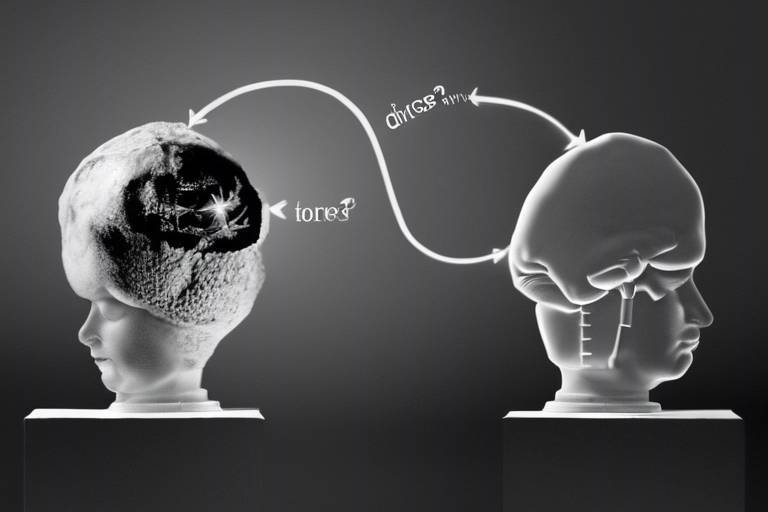Moral Consideration in Artificial Intelligence
As we plunge deeper into the digital age, the emergence of artificial intelligence (AI) has sparked a whirlwind of excitement and concern. It's like opening a Pandora's box filled with both incredible potential and daunting ethical dilemmas. The rapid advancements in AI technology raise crucial questions about the moral implications of its development and deployment in society. How do we ensure that these powerful tools serve the greater good rather than lead us down a treacherous path? This article aims to explore the intricate tapestry of ethical considerations surrounding AI, shedding light on how moral principles can guide us in harnessing its power responsibly.
When it comes to navigating the complex moral landscape of AI, various ethical frameworks provide a compass. Utilitarianism, for instance, emphasizes the greatest good for the greatest number, urging developers to consider the overall societal impact of their AI systems. On the other hand, deontology focuses on the adherence to rules and duties, suggesting that certain actions are inherently right or wrong, regardless of their outcomes. Finally, we have virtue ethics, which encourages the cultivation of moral character in developers and users alike, promoting integrity and responsibility in AI applications.
One of the most pressing concerns in AI deployment is the need for human oversight. Imagine a world where machines operate independently, making decisions without human intervention—sounds like a sci-fi thriller, right? While automation can enhance efficiency, it also poses risks. Maintaining human control over AI systems is essential to prevent harmful outcomes. This delicate balance between automation and human judgment is crucial; after all, who better to guide these technologies than the very beings they are designed to serve?
Bias in AI algorithms is a hot topic that cannot be overlooked. If we want to ensure fairness in AI decision-making, we must first understand the sources of bias. These biases can stem from various factors, including the data used to train AI systems, the algorithms themselves, and even the cultural contexts in which they are developed. To mitigate these biases, developers must employ strategies such as diverse data sets, regular audits, and transparency in algorithm design. By actively addressing bias, we can foster a more equitable technological landscape.
As AI systems become more autonomous, the question of accountability looms large. Who is responsible when an AI system causes harm? Is it the developer, the user, or the AI itself? This complex web of responsibility presents significant challenges. To navigate these murky waters, we must establish clear guidelines and regulations that delineate accountability. Understanding the implications for developers, users, and society at large is paramount in ensuring that AI technologies are used ethically and responsibly.
AI technologies often rely on vast amounts of data, raising significant privacy concerns. In our quest for innovation, how do we protect user privacy? Ethical considerations surrounding data collection, consent, and user privacy are critical in AI systems. Organizations must prioritize transparency in how data is collected and used, ensuring that individuals retain control over their personal information. After all, in the age of information, privacy is not just a luxury; it's a fundamental right.
The integration of AI into decision-making processes can enhance efficiency but also raises ethical dilemmas. Imagine relying on an algorithm to make critical decisions in healthcare, criminal justice, or hiring practices. While AI can analyze data faster than any human, it can also perpetuate biases and errors if not carefully monitored. Evaluating the moral implications of relying on AI for such decisions is essential to avoid unintended consequences that could harm individuals and communities.
The rise of AI has profound implications for the workforce, including job displacement and transformation. As machines take over repetitive tasks, what happens to the human workforce? While some jobs may become obsolete, new opportunities will also emerge. The ethical considerations surrounding automation and its effects on employment require us to think critically about how we can prepare our workforce for the future. Upskilling and reskilling initiatives will be crucial in ensuring that individuals can thrive in an AI-driven economy.
Looking ahead, the development of ethical AI is paramount. As we navigate this uncharted territory, emerging trends and potential regulations will play a significant role in shaping the future of AI. Interdisciplinary collaboration among technologists, ethicists, and policymakers will be essential in fostering responsible AI innovation. By working together, we can create a framework that promotes ethical practices while harnessing the transformative power of AI for the benefit of all.
- What is the role of ethics in AI? Ethics in AI guides the development and use of AI technologies to ensure they are aligned with human values and societal norms.
- How can we mitigate bias in AI? By using diverse data sets, conducting regular audits, and ensuring transparency in algorithms, we can address bias in AI systems.
- Who is accountable for AI decisions? Accountability in AI is complex and involves developers, users, and the systems themselves; clear guidelines are necessary.
- What are the privacy concerns with AI? AI systems often require extensive data collection, raising issues around consent, data security, and user privacy.
- How will AI impact employment? While AI may displace some jobs, it will also create new opportunities, necessitating upskilling and adaptation in the workforce.

The Ethical Frameworks for AI
When we dive into the world of artificial intelligence, we quickly realize that it's not just about algorithms and data. It's a complex tapestry woven with ethical considerations that guide how these technologies should be developed and used. Various ethical frameworks offer us different lenses through which we can examine AI's implications on society. Among the most prominent frameworks are utilitarianism, deontology, and virtue ethics. Each of these frameworks provides unique insights that can help shape our approach to AI.
Utilitarianism is perhaps the most straightforward of these frameworks. It advocates for actions that maximize overall happiness or utility. In the context of AI, this means that the development and deployment of AI technologies should aim to produce the greatest good for the greatest number of people. However, the challenge lies in quantifying this 'good' and ensuring that the benefits of AI do not come at the expense of marginalized groups. Imagine a self-driving car: if it must choose between the safety of its passengers and pedestrians, how do we determine what action maximizes overall happiness?
On the other hand, deontology emphasizes the importance of rules and duties. This framework argues that certain actions are inherently right or wrong, regardless of their outcomes. In AI, this could translate to a strict adherence to ethical guidelines, such as ensuring that AI systems respect individual rights and privacy. For instance, if an AI system is programmed to monitor employee productivity, it raises questions about surveillance and consent. Are we violating privacy rights for the sake of productivity? Deontological ethics would likely argue that the answer is yes.
Then we have virtue ethics, which focuses on the character and virtues of the individuals involved in creating and deploying AI. This approach suggests that ethical AI development should be guided by virtues such as fairness, honesty, and responsibility. It places emphasis on the motivations behind AI technologies rather than just their consequences. For example, if developers are motivated by a genuine desire to improve people's lives, they are more likely to create AI systems that are beneficial and ethical. The challenge here is fostering a culture within tech companies that prioritizes ethical considerations alongside profit.
To summarize these frameworks, we can create a simple table that highlights their core principles:
| Framework | Core Principle | Application in AI |
|---|---|---|
| Utilitarianism | Maximize overall happiness | Focus on benefits for the majority |
| Deontology | Adhere to rules and duties | Respect individual rights and privacy |
| Virtue Ethics | Focus on character and virtues | Prioritize ethical motivations in development |
As we navigate the ethical landscape of AI, it's crucial to understand that these frameworks are not mutually exclusive. In fact, they can complement each other, providing a more comprehensive understanding of the moral implications of AI technologies. By considering the principles of utilitarianism, deontology, and virtue ethics, we can foster a more responsible approach to AI development that not only enhances technological innovation but also prioritizes the well-being of society as a whole.
Ultimately, the conversation surrounding the ethical frameworks for AI is ongoing. As technology evolves, so too must our understanding of the moral principles that govern it. The challenge lies in creating a balanced approach that respects individual rights while promoting the greater good—a task that requires collaboration among developers, ethicists, and policymakers alike.
- What is the importance of ethics in AI? Ethics in AI is crucial to ensure that technologies are developed responsibly and do not harm individuals or society.
- Can AI systems be truly unbiased? While it's challenging to eliminate bias completely, strategies can be implemented to minimize its impact.
- Who is responsible for AI actions? Accountability in AI is complex and can involve developers, users, and even the organizations deploying the technology.
- How can we ensure privacy in AI applications? Implementing strict data protection regulations and obtaining user consent are essential for safeguarding privacy.

The Role of Human Oversight
When we dive into the world of artificial intelligence, one of the most critical elements that surface is the concept of human oversight. Imagine a ship sailing through uncharted waters. Without a skilled captain at the helm, that ship could easily veer off course, encountering treacherous waters and unforeseen obstacles. Similarly, AI systems, while incredibly powerful and efficient, require a guiding hand to ensure they navigate the complexities of the real world responsibly.
Human oversight serves as a safeguard against the unpredictable nature of AI. These systems can analyze vast amounts of data and make decisions at lightning speed, but they lack the nuanced understanding of human emotions, ethics, and moral implications. This is where the importance of maintaining human control becomes evident. A well-designed AI can provide insights and recommendations, but ultimately, it is the human operator who must weigh these options against ethical standards and societal norms.
Moreover, the balance between automation and human judgment is crucial. While automation can enhance efficiency and productivity, it can also lead to a detachment from the human elements that drive decision-making. For instance, consider the use of AI in healthcare. An AI system can analyze patient data and suggest treatment plans, but it is the doctor who must interpret these recommendations, considering the patient's unique circumstances, preferences, and emotional well-being. Without human oversight, there is a risk that AI could prioritize efficiency over empathy, leading to detrimental outcomes.
To illustrate the necessity of human oversight, let's look at a few key areas where it plays an essential role:
- Ethical Decision-Making: Humans must ensure that AI systems align with ethical standards, especially in sensitive areas like law enforcement and healthcare.
- Accountability: In cases where AI systems fail or cause harm, human oversight is vital for determining accountability and responsibility.
- Adaptability: Humans can adapt AI systems to changing circumstances and societal values, ensuring they remain relevant and ethical.
As we advance into an era where AI continues to permeate various aspects of our lives, the role of human oversight cannot be overstated. It acts as a bridge between cold, calculated algorithms and the warm, messy reality of human existence. The future of AI development hinges on our ability to maintain this balance, ensuring that while AI can assist us in making informed decisions, it never replaces the human touch that is so vital to our society.
In conclusion, as we embrace the potential of artificial intelligence, we must remain vigilant in our commitment to human oversight. It is not merely a safety net; it is an essential component that ensures AI technologies serve humanity in a beneficial and ethical manner. After all, in a world increasingly influenced by AI, it is our responsibility to steer the ship and chart a course that prioritizes human values and ethical considerations.
- Why is human oversight necessary in AI? Human oversight is essential to ensure that AI systems operate within ethical guidelines, account for human emotions, and adapt to changing societal values.
- How can we maintain human oversight in AI systems? By involving humans in the decision-making process, establishing clear accountability, and ensuring that AI technologies are transparent and understandable.
- What are the risks of lacking human oversight? Without human oversight, AI systems can make decisions that are biased, unethical, or harmful, leading to significant negative consequences for individuals and society.

Bias and Fairness in AI
When we talk about artificial intelligence, one of the hottest topics that often comes up is bias. It’s like the elephant in the room that nobody wants to acknowledge, yet it can have monumental implications on how AI systems operate and affect our lives. Imagine a world where your AI assistant, designed to streamline your life, makes decisions based on flawed data that results in unfair treatment. This is not just a theoretical concern; it’s a reality we face today. The sources of bias in AI can be numerous, ranging from the data used to train these systems to the algorithms themselves.
To truly understand bias in AI, we must first recognize where it originates. The data that feeds AI systems can be biased for various reasons, including historical inequities, societal norms, and even the selection process of the data itself. For instance, if an AI model is trained on data that predominantly features one demographic group, it may not perform well or make fair decisions for others. This leads to a ripple effect that can reinforce existing stereotypes and perpetuate discrimination.
Moreover, the algorithms that power AI systems can also introduce bias. Even if the data is balanced, the way the algorithms are structured can skew results. For example, if an algorithm is designed to prioritize certain outcomes over others based on flawed assumptions, it may lead to unfair advantages for some groups while disadvantaging others. Therefore, it’s crucial for developers to continuously evaluate and refine their algorithms to ensure they promote fairness and equality.
So, how do we tackle this pressing issue? One approach is to implement rigorous testing of AI systems to identify biases before they are deployed. This involves not just looking at the data but also understanding the context in which it was collected. Additionally, incorporating diverse teams in the development process can help bring different perspectives to the table, which can lead to more equitable AI solutions.
Another vital strategy is to establish clear guidelines and ethical standards for AI development. These should include principles of fairness, accountability, and transparency. By holding developers accountable for the outcomes of their AI systems, we can foster a culture of responsibility that prioritizes ethical considerations.
In summary, addressing bias in AI is not just a technical challenge; it’s a moral imperative. As we continue to integrate AI into various aspects of our lives, we must remain vigilant and proactive in ensuring that these systems are fair and just. After all, the goal of AI should not only be efficiency but also the promotion of equity in our society.
- What is bias in AI? Bias in AI refers to the systematic favoritism or discrimination that occurs in AI systems due to skewed data or flawed algorithms.
- How can bias in AI be identified? Bias can be identified through rigorous testing and evaluation of AI systems, including analyzing the data used and the outcomes produced.
- What are the consequences of biased AI? Biased AI can lead to unfair treatment of individuals or groups, reinforcing stereotypes and perpetuating discrimination in various sectors, including hiring, law enforcement, and healthcare.
- How can developers prevent AI bias? Developers can prevent AI bias by using diverse datasets, involving multidisciplinary teams, and adhering to ethical guidelines throughout the development process.

Accountability and Responsibility
In the rapidly evolving landscape of artificial intelligence (AI), the question of accountability and responsibility looms large. As AI systems become more autonomous and integrated into our daily lives, determining who is held accountable for their actions is critical. Imagine a self-driving car that causes an accident; should the blame fall on the manufacturer, the software developer, or the user? This complex web of responsibility raises numerous ethical dilemmas that we must navigate carefully.
One of the significant challenges in establishing accountability in AI is the lack of transparency in many algorithms. Often described as "black boxes," these systems can make decisions based on data and patterns that are not easily understood by humans. This opacity can lead to situations where harm is done, but it is unclear who should be held responsible. To address this, we need to consider a framework for accountability that includes:
- Developers: Those who create and train the AI systems must ensure that their algorithms are designed with ethical considerations in mind.
- Organizations: Companies deploying AI technologies should establish clear guidelines and policies that define accountability.
- Users: Individuals interacting with AI systems also bear some responsibility, especially when they misuse or misinterpret the technology.
Moreover, the implications of AI actions extend beyond the immediate parties involved. Society as a whole must grapple with the consequences of AI deployment. For instance, if an AI system used in healthcare makes a flawed diagnosis, the ripple effects can impact patients, healthcare providers, and even insurance companies. In these cases, establishing a collective responsibility framework becomes essential.
Another critical aspect of accountability in AI is the role of regulation. As governments and regulatory bodies begin to draft policies surrounding AI technologies, they must consider how to hold parties accountable when things go awry. This could involve creating standards for AI development, mandating transparency in algorithms, and outlining penalties for negligence. The table below illustrates potential regulatory measures and their implications:
| Regulatory Measure | Description | Implications |
|---|---|---|
| Transparency Requirements | Mandating that AI developers disclose how their algorithms work. | Increased trust and understanding from users and stakeholders. |
| Liability Frameworks | Establishing clear guidelines on who is liable when AI systems cause harm. | Encourages responsible development and usage of AI technologies. |
| Ethical Audits | Requiring regular evaluations of AI systems for ethical compliance. | Ensures ongoing accountability and adaptation to new ethical standards. |
Ultimately, the quest for accountability in AI is not just a legal or regulatory issue; it is a moral one. As we continue to develop these powerful technologies, we must ask ourselves: What kind of future do we want to create? It is imperative that all stakeholders—developers, organizations, users, and policymakers—collaborate to establish a culture of responsibility that prioritizes ethical considerations alongside technological advancement. Only then can we harness the full potential of AI while minimizing its risks.
- Who is responsible if an AI system causes harm?
Responsibility can fall on multiple parties, including developers, organizations, and users, depending on the context and the nature of the harm. - How can we ensure accountability in AI development?
Implementing transparency requirements, liability frameworks, and regular ethical audits can help establish accountability in AI systems. - What role does regulation play in AI accountability?
Regulation can set standards for ethical AI development, outline responsibilities, and enforce penalties for negligence.

Privacy Concerns in AI Applications
In today's digital age, where data reigns supreme, the intersection of artificial intelligence (AI) and privacy has become a hot topic. AI applications often rely on vast amounts of data to learn and make decisions, which raises significant questions about how that data is collected, used, and protected. Imagine a world where your every move, every click, and every purchase is analyzed by algorithms to tailor experiences just for you. Sounds convenient, right? But at what cost?
One of the primary concerns surrounding AI is the potential for invasion of privacy. With AI systems continuously gathering data from various sources, including social media, online transactions, and even smart devices, individuals may feel like their personal lives are under constant surveillance. This data collection can lead to a feeling of vulnerability, where people question who has access to their information and how it is being used.
Moreover, the concept of informed consent becomes murky in the realm of AI. Often, users may not fully understand what they are agreeing to when they accept terms and conditions. For instance, consider the following scenarios:
- A fitness app that tracks your location and health metrics but fails to disclose how that data might be shared with third parties.
- A social media platform that uses AI algorithms to analyze your interactions, potentially leading to targeted ads that invade your personal space.
These situations highlight the need for transparency in AI applications. Users should be made aware of what data is being collected, how it will be used, and who it may be shared with. Data protection regulations, such as the General Data Protection Regulation (GDPR) in Europe, aim to address these concerns by enforcing stricter guidelines on data collection and user consent. However, compliance can be challenging, especially for smaller companies that may lack the resources to navigate complex legal frameworks.
Another critical aspect to consider is the potential for data breaches. AI systems, particularly those that store sensitive information, can be prime targets for cyberattacks. When hackers gain access to these systems, they can exploit personal data, leading to identity theft, financial loss, and a breach of trust. This risk emphasizes the importance of robust security measures to safeguard data against unauthorized access.
Furthermore, the ethical implications of using AI in surveillance technologies cannot be overlooked. Governments and corporations are increasingly utilizing AI for monitoring purposes, raising concerns about civil liberties and the potential for abuse. For example, facial recognition technology, while beneficial for security, can lead to profiling and discrimination if not regulated appropriately. This brings us to a crucial question: how do we balance the benefits of AI with the need to protect individual privacy?
As we navigate the complexities of AI applications, it becomes clear that a collaborative approach is essential. Stakeholders, including developers, policymakers, and users, must engage in open dialogues to establish ethical guidelines that prioritize privacy. By fostering a culture of accountability and transparency, we can create AI systems that respect user privacy while still delivering innovative solutions.
In conclusion, the privacy concerns surrounding AI applications are multifaceted and require careful consideration. As technology continues to evolve, so must our understanding of how to protect personal data in an increasingly interconnected world. The challenge lies not only in developing advanced AI technologies but also in ensuring that these systems operate within a framework that values and safeguards individual privacy.
- What are the main privacy concerns related to AI?
Privacy concerns primarily revolve around data collection, informed consent, data breaches, and surveillance. - How does AI impact user consent?
Many users may not fully understand what they are consenting to when they agree to terms and conditions, making informed consent a significant issue. - What regulations exist to protect user privacy in AI?
Regulations like the GDPR aim to enforce stricter guidelines on data collection and user consent. - How can we ensure the security of AI systems?
Implementing robust security measures and regularly updating systems can help protect against data breaches.

AI in Decision-Making Processes
Artificial Intelligence (AI) is revolutionizing the way we make decisions across various sectors, from healthcare to finance and even in our daily lives. Imagine having a personal assistant that can analyze vast amounts of data in seconds, providing you with insights that would take a human hours, if not days, to compile. However, with great power comes great responsibility, and the integration of AI into decision-making processes raises some profound ethical dilemmas that we cannot ignore.
One of the most significant advantages of AI in decision-making is its ability to process information at lightning speed. For instance, in the medical field, AI algorithms can analyze patient data and historical medical records to suggest diagnoses or treatment plans. This capability can lead to improved patient outcomes and more efficient healthcare delivery. But, we must ask ourselves: does this mean we should entirely rely on AI for critical health decisions? The answer isn't straightforward.
While AI can enhance efficiency, it can also introduce biases that may lead to unfair or harmful outcomes. For example, if an AI system is trained on data that reflects existing inequalities, it may perpetuate these biases in its decision-making. This is particularly concerning in areas such as criminal justice, where biased algorithms can lead to disproportionate sentencing or wrongful convictions. Therefore, it is crucial to ensure that AI systems are transparent and that their decision-making processes are understandable to humans. This raises the question of accountability: if an AI makes a flawed decision, who is responsible?
Moreover, the reliance on AI for decision-making can create a sense of complacency among human operators. When we delegate important decisions to machines, we may inadvertently undermine our own judgment and critical thinking skills. It's essential to strike a balance between leveraging AI's capabilities and maintaining human oversight. After all, AI lacks the emotional intelligence and ethical reasoning that humans possess. In high-stakes situations, such as military operations or judicial rulings, the consequences of a misguided AI decision can be catastrophic.
To further illustrate the impact of AI on decision-making, consider the following table that outlines the benefits and challenges of AI integration:
| Benefits of AI in Decision-Making | Challenges of AI in Decision-Making |
|---|---|
| Speed and efficiency in data analysis | Potential for biased outcomes |
| Ability to handle large datasets | Lack of transparency in algorithms |
| Improved accuracy in predictions | Over-reliance on technology |
| Enhanced decision support | Accountability issues |
As we navigate this complex landscape, it's vital to engage in ongoing discussions about the ethical implications of AI in decision-making. Stakeholders from various fields—including ethicists, technologists, and policymakers—must collaborate to establish guidelines that prioritize fairness, accountability, and transparency. By doing so, we can harness the power of AI while ensuring that human values remain at the forefront of our decision-making processes.
In conclusion, while AI has the potential to revolutionize decision-making, we must tread carefully. The integration of AI should not replace human judgment but rather enhance it. As we embrace this technology, let’s keep the conversation going about how we can responsibly shape the future of AI in decision-making.
- What are the main benefits of using AI in decision-making? AI can process large volumes of data quickly, enhance accuracy in predictions, and support human decision-makers by providing valuable insights.
- What are the ethical concerns surrounding AI in decision-making? Major concerns include bias in algorithms, lack of transparency, accountability issues, and the potential for over-reliance on technology.
- How can we ensure that AI decision-making is fair? By involving diverse stakeholders in the development process, regularly auditing AI systems for bias, and maintaining human oversight in critical decisions.
- Can AI make decisions without human input? While AI can provide recommendations based on data, it is crucial to have human oversight to ensure ethical considerations are taken into account.

The Impact of AI on Employment
The rise of artificial intelligence (AI) is akin to a double-edged sword, cutting through the fabric of traditional employment structures while simultaneously weaving new opportunities. As AI technologies advance, they are reshaping industries, redefining job roles, and even creating entirely new career paths. However, this transformation comes with its own set of challenges and ethical considerations that society must address.
One of the most pressing concerns regarding AI in the workforce is job displacement. Many fear that as machines become more capable of performing tasks traditionally done by humans, entire sectors may face significant reductions in workforce. For instance, roles in manufacturing, customer service, and data entry are increasingly being automated. A study by the McKinsey Global Institute suggests that by 2030, up to 375 million workers may need to transition to new occupations due to automation. This statistic is not just a number; it represents millions of lives that could be affected.
But it’s not all doom and gloom! While AI can replace certain jobs, it also has the potential to augment human capabilities and create new job opportunities. For example, AI can handle repetitive tasks, allowing employees to focus on more complex and creative aspects of their work. In fields like healthcare, AI is being used to assist doctors in diagnosing diseases, which not only improves efficiency but also enhances patient care. This shift could lead to a demand for roles that require a combination of technical skills and human empathy.
Moreover, the integration of AI into various industries is prompting a shift in the skill sets that employers seek. As the landscape of work evolves, so too must the workforce. Skills in data analysis, machine learning, and AI ethics are becoming increasingly valuable. Educational institutions and training programs are starting to adapt by offering courses that prepare individuals for the jobs of tomorrow. For instance, coding bootcamps and online platforms are emerging to equip workers with the necessary skills to thrive in an AI-driven economy.
However, the transition to an AI-enhanced workforce raises important questions about equity and access. Not everyone has equal opportunities to acquire the skills needed for these new roles. This disparity can lead to a widening gap between those who are able to adapt and those who are left behind. Therefore, it is crucial for policymakers, businesses, and educational institutions to collaborate in creating pathways for reskilling and upskilling workers. This collaboration can help ensure that the benefits of AI are distributed fairly across society.
To better understand the impact of AI on employment, consider the following table which outlines the potential benefits and challenges:
| Benefits | Challenges |
|---|---|
| Increased efficiency and productivity | Job displacement in certain sectors |
| Creation of new job roles | Need for new skill sets |
| Enhanced decision-making capabilities | Equity in access to training |
| Improved workplace safety | Ethical considerations in AI deployment |
In conclusion, the impact of AI on employment is a complex tapestry of challenges and opportunities. As we navigate this uncharted territory, it is essential to foster a dialogue about the ethical implications of AI in the workforce. By prioritizing education, equity, and ethical considerations, we can harness the power of AI to create a future that benefits everyone.
- Will AI replace all jobs in the future? While AI will automate certain tasks, it is also expected to create new job opportunities that require human oversight and creativity.
- What skills will be in demand as AI continues to grow? Skills in data analysis, programming, and AI ethics will be increasingly sought after in the job market.
- How can workers prepare for the changes brought by AI? Upskilling and reskilling through courses and training programs will be essential for adapting to the evolving job landscape.
- What role do policymakers play in addressing AI's impact on employment? Policymakers can help create frameworks for education and training programs that ensure equitable access for all workers.

Future Directions for Ethical AI
The future of ethical AI is an exciting yet complex landscape that promises to reshape our interactions with technology. As we stand on the brink of an AI revolution, the importance of embedding ethical considerations into AI development cannot be overstated. Imagine a world where AI systems not only enhance our lives but also respect our values and principles. This vision is achievable, but it requires a concerted effort from developers, policymakers, and society at large.
One of the most pressing issues is the need for interdisciplinary collaboration. Engineers, ethicists, sociologists, and legal experts must come together to create a holistic approach to AI ethics. This collaboration can foster innovative solutions that address the multifaceted challenges posed by AI. Just as a symphony requires various instruments to create harmonious music, ethical AI requires diverse perspectives to create balanced and fair systems.
Additionally, the establishment of regulatory frameworks is essential. Governments and international organizations are beginning to recognize the need for regulations that govern AI. These regulations should focus on transparency, accountability, and fairness. For instance, the European Union's proposed AI Act aims to provide a legislative framework that classifies AI systems based on risk levels, ensuring that high-risk applications undergo rigorous scrutiny. Such measures can help mitigate potential harms while promoting innovation.
Moreover, public awareness and education about AI ethics are crucial. As AI technologies permeate our daily lives, individuals must understand their rights and the implications of AI systems. This can be achieved through educational programs and public discussions that demystify AI and its ethical considerations. When people are informed, they can engage in meaningful conversations about the direction of AI and advocate for ethical practices.
Finally, the future of ethical AI also hinges on continuous monitoring and evaluation. As AI systems evolve, so too must our approaches to ethics. Regular assessments can help identify biases, assess the impact on society, and ensure that AI systems remain aligned with human values. This adaptive approach is akin to tending a garden; it requires ongoing attention and care to flourish.
In conclusion, the future directions for ethical AI are filled with potential and promise. By fostering interdisciplinary collaboration, establishing robust regulatory frameworks, promoting public awareness, and ensuring continuous evaluation, we can build a future where AI serves humanity ethically and responsibly. The journey towards ethical AI is just beginning, and it is a path we must tread carefully, with an unwavering commitment to our shared values.
- What is ethical AI? Ethical AI refers to the development and deployment of AI systems that align with moral principles, ensuring fairness, accountability, and transparency.
- Why is interdisciplinary collaboration important in AI ethics? Different fields bring unique perspectives and expertise, which can lead to more comprehensive solutions to the ethical challenges posed by AI.
- How can regulations impact AI development? Regulations can help ensure that AI systems are developed responsibly, minimizing risks and promoting fairness and accountability.
- What role does public awareness play in ethical AI? Educating the public about AI ethics empowers individuals to engage in discussions and advocate for ethical practices in AI development.
- Why is continuous monitoring necessary for AI systems? Continuous monitoring helps identify and mitigate biases and ensures that AI systems remain aligned with human values as they evolve.
Frequently Asked Questions
- What are the main ethical frameworks guiding AI development?
There are several key ethical frameworks that shape the development of AI, including utilitarianism, which focuses on maximizing overall happiness; deontology, which emphasizes duty and rules; and virtue ethics, which considers the character and intentions of the developers. Each of these frameworks offers a unique lens through which we can evaluate the moral implications of AI technologies.
- Why is human oversight important in AI systems?
Human oversight is crucial because it helps prevent harmful outcomes that can arise from fully automated systems. Without human judgment, AI can make decisions that may not align with societal values or ethical standards. Maintaining a balance between automation and human control ensures that AI operates within safe and ethical boundaries.
- How can we address bias in AI algorithms?
Addressing bias in AI algorithms involves identifying the sources of bias, which can stem from skewed training data or flawed design. Strategies to mitigate bias include using diverse datasets, implementing fairness-aware algorithms, and conducting regular audits of AI systems to ensure they are making equitable decisions.
- Who is accountable when AI systems cause harm?
Determining accountability in the event of harm caused by AI systems can be complex. It often involves multiple parties, including developers, users, and even organizations that deploy these technologies. Establishing clear guidelines and regulations is essential to address these accountability challenges effectively.
- What are the privacy concerns associated with AI?
AI technologies often rely on large amounts of personal data, raising significant privacy concerns. Issues such as data collection, consent, and user privacy must be carefully considered to ensure that individuals' rights are respected. Implementing robust data protection measures is crucial to address these ethical considerations.
- How does AI impact decision-making processes?
The integration of AI into decision-making processes can enhance efficiency but also raises ethical dilemmas. Relying on AI for critical decisions, such as in healthcare or criminal justice, can lead to questions about fairness, transparency, and accountability. It's vital to evaluate the moral implications of such reliance.
- What are the implications of AI on employment?
AI's rise is transforming the workforce, leading to both job displacement and the creation of new opportunities. While automation can enhance productivity, it also raises ethical concerns about the future of work, including the need for reskilling and the impact on job security. Addressing these challenges is essential for a balanced approach to AI integration in the workplace.
- What future directions are there for ethical AI?
The future of ethical AI involves emerging trends such as increased regulation, interdisciplinary collaboration, and the development of ethical guidelines. As AI continues to evolve, fostering responsible innovation will be paramount to ensure that these technologies benefit society while minimizing risks and ethical dilemmas.



















